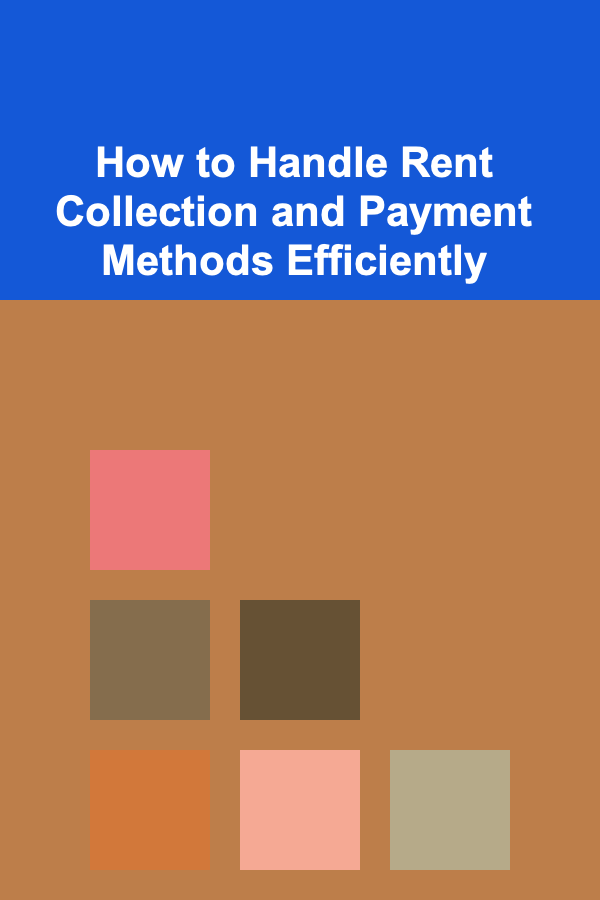
How to Handle Rent Collection and Payment Methods Efficiently
ebook include PDF & Audio bundle (Micro Guide)
$12.99$7.99
Limited Time Offer! Order within the next:

Managing a rental property involves many tasks, and one of the most crucial aspects is handling rent collection and payment methods efficiently. Whether you're a seasoned landlord with multiple properties or a first-time property owner, ensuring timely and hassle-free rent collection is vital to maintaining a stable cash flow, reducing the chances of late payments, and preventing conflicts with tenants. This comprehensive guide will explore the best practices, strategies, and tools to streamline the rent collection process and make it more effective for both landlords and tenants.
The Importance of Efficient Rent Collection
Rent collection is the backbone of any rental business. Consistent and reliable payments help ensure that you, as a property owner, can meet your financial obligations, maintain your property, and even reinvest in further property purchases. However, without a structured and efficient system in place, rent collection can become a stressful and time-consuming task.
Efficient rent collection:
- Promotes Financial Stability: On-time rent payments are essential for covering property maintenance, taxes, utilities, insurance, and other operational costs.
- Reduces Late Payments and Missed Rent: A clear and well-communicated payment process helps tenants understand expectations, leading to fewer late payments.
- Improves Landlord-Tenant Relationships: A streamlined payment process minimizes friction, creating a positive relationship and reducing disputes over payment deadlines and amounts.
- Increases Professionalism: An organized system for collecting rent demonstrates professionalism and accountability, which can attract higher-quality tenants.
Step 1: Establish a Clear Rent Collection Policy
Before you begin collecting rent, it's essential to create a detailed and transparent rent collection policy that you can share with your tenants. A well-defined rent policy sets clear expectations and reduces misunderstandings between you and your tenants.
Key Elements of a Rent Collection Policy:
- Due Date and Grace Period: Specify the date on which rent is due each month. Many landlords choose the first of the month, but you can adjust it based on your preference. Additionally, consider including a grace period (usually 3--5 days) to accommodate tenants who may need a little extra time.
- Late Fees: Make sure your lease agreement clearly outlines the consequences of late payments. Typically, landlords charge a flat fee (e.g., $50) or a percentage of the rent (e.g., 5%) if rent is not paid by the due date.
- Accepted Payment Methods: Clearly specify the payment methods you accept. Be it checks, bank transfers, online payments, or other forms, make sure to set guidelines for each method.
- Returned Check Policy: Address situations where tenants' checks are returned due to insufficient funds. Include any charges or consequences related to bounced checks.
- Consequences of Non-Payment: Outline the legal steps that you will take if tenants continue to fail to make payments, including eviction proceedings.
Having a comprehensive rent collection policy in place ensures clarity and reduces any confusion about payment expectations.
Step 2: Offer Convenient Payment Methods
As the world becomes increasingly digital, offering convenient and flexible rent payment options is crucial for improving efficiency. A payment method that works for both you and your tenants can help ensure timely rent payments and improve tenant satisfaction. Below are some popular and effective rent payment methods:
a. Online Payment Systems
Online rent payment platforms have become the preferred method for many tenants due to their convenience and flexibility. These platforms offer several benefits, including:
- Automated Reminders: Many online platforms send reminders to tenants before their rent is due, reducing the chances of missed payments.
- Security and Record Keeping: Payments made online are secure, and tenants and landlords can access transaction histories and receipts at any time.
- Multiple Payment Options: These platforms often accept various forms of payment, such as credit/debit cards, bank transfers, and ACH transfers, giving tenants more flexibility.
- Ease of Use: Online payment systems are user-friendly, allowing tenants to pay rent from the comfort of their own home using their smartphones, tablets, or computers.
Some popular rent payment platforms include:
- PayPal
- Venmo
- Zelle
- Rentec Direct
- TenantCloud
- Cozy
These platforms are often free or charge minimal transaction fees, making them a cost-effective solution for both landlords and tenants.
b. Direct Bank Transfers
Direct bank transfers are another efficient method for rent collection. With this method, tenants can transfer rent payments directly to your bank account via ACH (Automated Clearing House) transfers. The main benefits of direct bank transfers are:
- No Fees for Landlords: Unlike credit card payments, which may involve processing fees, ACH transfers typically do not come with extra charges.
- Security: Bank transfers are highly secure and eliminate the risks associated with handling cash or checks.
- Convenience: Tenants can schedule automatic payments, ensuring timely rent collection without having to remember the due date each month.
To set up direct bank transfers, you will need to provide tenants with your bank account information, which should only be shared securely to protect against fraud.
c. Checks
Although online payments are becoming more popular, many tenants still prefer to pay by check. This method is familiar and often used for larger transactions. The advantages of accepting checks include:
- Paper Trail: Checks provide a clear paper trail that can be useful for both the landlord and tenant, especially in cases of disputes or audits.
- Familiarity: Tenants who are more comfortable with traditional methods may prefer paying by check.
However, checks can also be slower than online payments, and there is a risk of bounced checks if tenants do not have sufficient funds. As a landlord, you should clearly outline your policy regarding returned checks and any associated fees.
d. Cash Payments
While some landlords may accept cash payments, this method is generally not recommended due to the potential risks involved:
- Lack of Documentation: Without a receipt or paper trail, cash payments can lead to misunderstandings about whether a payment was made or not.
- Security Risks: Handling large amounts of cash can be unsafe, and there's a risk of theft or loss.
- Inconvenience: Accepting cash payments can be time-consuming and may require you to meet tenants in person, which can be inconvenient for both parties.
If you choose to accept cash, make sure to always provide a receipt and document the payment properly.
Step 3: Set Up Automated Systems and Tools
To streamline rent collection, consider using property management software and automated tools that can help with tracking payments, sending reminders, and managing tenant communications. Automated systems save time and reduce the chances of errors, which can be especially helpful when managing multiple rental properties.
a. Automated Rent Collection Systems
Using software that automates the rent collection process can significantly reduce your workload. These systems allow tenants to make payments online, schedule automatic rent payments, and receive notifications for upcoming due dates. Some of the benefits of automated systems include:
- Rent Payment Scheduling: Tenants can schedule recurring payments, ensuring that rent is paid on time every month.
- Late Fee Management: The software automatically applies late fees for overdue payments, ensuring that the terms of your lease agreement are enforced.
- Financial Tracking: Automated systems can help track payments and generate reports, making tax season or audits much easier.
- Integration with Accounting Software: Many property management tools integrate with accounting software, allowing you to easily track income, expenses, and profits.
b. Rent Payment Reminders
Setting up automated rent reminders is another effective way to ensure that tenants are aware of upcoming payment dates. Many online platforms and property management software offer this feature, which sends tenants a notification several days before their rent is due. By reminding tenants in advance, you can reduce the chances of late payments.
c. Payment Receipts and Transaction Records
Another benefit of using automated tools is the ability to automatically generate receipts for payments. This eliminates the need for you to manually issue receipts, and it gives tenants proof of payment for their records.
Step 4: Handling Late Payments
Despite your best efforts, there may still be instances where tenants miss rent payments. When this happens, it's important to handle the situation professionally and promptly. Having a clear system in place to address late payments can help you avoid disputes and ensure that any issues are resolved quickly.
a. Enforce Late Fees
If your lease agreement includes late fees, make sure to enforce them consistently. Late fees should be reasonable, and the process for charging them should be clearly outlined in your rental agreement. Be sure to communicate the late fee policy to tenants upfront to avoid confusion.
b. Send Payment Reminders
If rent is overdue, send polite but firm reminders to your tenants. In most cases, tenants simply forget or may be facing temporary financial difficulties. Sending a gentle reminder can often resolve the issue without the need for further action.
c. Offer Payment Plans
If a tenant is facing financial hardship, you may consider offering a payment plan to allow them to catch up on their rent. While this may not be suitable for every situation, it can be a good solution in cases where the tenant is generally reliable but struggling due to unforeseen circumstances.
d. Take Legal Action If Necessary
If late payments become a recurring issue or if tenants refuse to pay altogether, you may need to consider legal action. This could include sending a formal notice of eviction, pursuing a small claims court case, or working with a collection agency. Be sure to follow the legal process in your jurisdiction, as mishandling a late payment situation can have serious consequences.
Step 5: Communicate Clearly with Tenants
Clear communication is essential for maintaining a smooth rent collection process. Make sure your tenants understand their responsibilities regarding rent payment, and be open to discussing any issues they may encounter.
- Provide Clear Instructions: Ensure that your tenants know exactly how to make payments and what methods are accepted.
- Be Available for Questions: Be accessible to tenants who have questions or concerns about the payment process.
- Create an Open Dialogue: Encourage tenants to let you know ahead of time if they anticipate any issues with making their rent payment.
Conclusion
Efficient rent collection and payment management are essential to maintaining a healthy and profitable rental business. By establishing clear policies, offering convenient payment methods, leveraging automation tools, and communicating effectively with tenants, you can streamline the rent collection process and reduce the stress associated with managing rental properties. A well-organized rent collection system not only benefits landlords but also enhances the tenant experience, fostering a professional and respectful landlord-tenant relationship.

How to Financially Prepare for a Career Change
Read More
How to Get Involved in Climate Research
Read More
How to Make Your Home More Comfortable During Winter Renovations
Read More
How to Streamline Airport Security Checks with Proper Packing
Read More
How To Deal with Sudden Weather Changes on the Trail
Read More
How to Date When You're on a Budget
Read MoreOther Products

How to Financially Prepare for a Career Change
Read More
How to Get Involved in Climate Research
Read More
How to Make Your Home More Comfortable During Winter Renovations
Read More
How to Streamline Airport Security Checks with Proper Packing
Read More
How To Deal with Sudden Weather Changes on the Trail
Read More